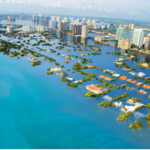June 13, 2020 – I am retired and living off income from investments and the prescribed pension plans that I paid into over a lifetime of work, and an old-age security supplement that is Canada’s answer to providing a social safety net. Watching the performance of stock market indices in recent weeks has alarmed me not because of the impact it is having on our family’s financial security (our portfolio contains a mix of high and low-risk investments), but because it appears to be disconnected from the economic reality of national economies in the face of an ongoing pandemic, let alone the longer-term threat of global warming.
I have asked investment councilors to make recommendations and choices for me that take into consideration climate risk, that look for sustainability mission statements in companies, and that seek out funds focused on a green and zero-carbon future. What has surprised me is how slow these advisors are in being able to respond with the needed expertise to give good advice about investment and climate risk.
Part of the problem for them is the lack of honesty on the part of many companies when it comes to climate risk mitigation strategies. Many companies bandy about words like “sustainability” in their annual reports but show little about implementing best climate change mitigation practices in terms of current operations. Nor am I impressed by companies that make no effort to put in writing a climate-risk plan for facilities, operations, and employees.
Back in November of 2018, I interviewed Yoon Hi Kim, Director of Advisory Services at Four Twenty Seven, a California company that provides market intelligence on climate change risk. At the time of our talk I found very few with tools and expertise to advise companies and governments about the growing threat of global warming.
Today, not much has changed. In my latest survey of those with climate risk expertise I looked at three companies that are at least “talking the talk,” but I am uncertain if two of the three can “walk the walk.”
For example, take Mercer, a company I did consulting work for eons ago. Mercer is in the pension business, advising governments and large corporations about investments, benefits packages, retirement, and risk. The company recently completed a project for the World Economic Forum which focused on long-term investors and looked at six different global risks: climate change, freshwater security, geopolitical instability, disruptions from technological change, demographic shifts, and monetary policy impacts on interest rates.
The project didn’t discuss pandemic as a risk factor which in hindsight appears to be an error of omission. In looking at the strain on global health systems from environmental, social, and demographic changes, pandemic should have been considered. Mercer described the “creaking health system” becoming further constrained by limited capacity. What would the report have said after the arrival of COVID-19? Think about the low inventories of personal protective equipment (PPE), the paucity of lifesaving equipment like ventilators, critical-care beds, or the lack of up-to-date protocols to provide governments and healthcare workers with the necessary guidance and information needed for effective decision-making.
Another established company that has provided accounting and advisory services around risk is Ernst Young (EY). EY has produced a report for banks and asset managers that looks at climate change risk. In it, EY states the need to make climate change risk “become a permanent part of everyday decision-making.” It then goes on to largely regurgitate the content of numerous United Nations’ IPCC reports and findings and combines that with a discussion on how to treat stranded assets and the risk exposure they engender as a business opportunity.
Then there is a niche investment consulting firm like Toronto-based PIMCO. It has created a set of tools designed to mitigate and manage climate-related risks to portfolios. These include the following:
- Climate Macro Tracker which takes a global accounting of risk,
- Portfolio Climate Risk Heat Maps for individual business sectors,
- Issuer Climate Risk Scores for individual business sectors,
- Energy and Technology Mix Analysis to monitor carbon impacts on corporate holdings,
- Portfolio Carbon Intensity Analysis that compares different portfolios against benchmarks based on the weighted average sum of direct and indirect greenhouse gas emissions from energy purchases,
- Green Bonds Scoring that tracks the issuance and performance of these investment instruments,
- Expectations Management Strategies to monitor and encourage disclosure and strategy on climate change.
It is not easy to measure the moving target and intangibles of global warming to come up with a reliable interpretation that can be applied to investment strategies. PIMCO’s tools are interesting because they start at the macro level and then drill down to specific business niches and individual companies. How reliable their data collection is remains to be seen.
Why is that? One of the challenges about climate change is the lack of micro-detail in the various predictive models. A macro view of climate change is not very useful to an investor looking to understand the impact global warming will have on a specific industrial sector, individual company, or specific location of a strategic corproate asset.
In a Bloomberg Green article published on June 12, Kate Mackenzie writes, “Scientists who work with climate models warn that apparent granularity can be worse than illusory and give an even less accurate view of what’s at stake.” Mackenzie concludes that we are still in the “teething” phase in terms of predictive analytics that can be applied to investment strategies. PIMCO and Four Twenty Seven are among the few who have built and are continuing to test and improve the tools needed for investors like me to ensure a secure income to live on in retirement, and a viable future for those who follow in the 21st century and beyond.
















